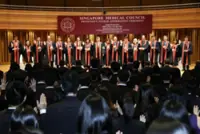SINGAPORE: When music maestro A.R. Rahman performs at the National Stadium on Aug 31, it will be the biggest concert in Singapore staged by an Indian artiste.
The venue is one of Singapore’s largest for concerts, and organisers Unusual Entertainment and Maestro Productions Global are expecting an audience of 25,000 for the prolific artiste, whose works span more than 160 film soundtracks and albums.
Singapore has always been special to the 57-year-old Oscar-, Grammy- and Golden Globe-winning musician, composer and singer. It was the first country that he travelled to out of India, and it was where he bought some of his earliest sound equipment.
“It was around 1985 or 1986,” Rahman recalls in a recent Zoom interview from India with The Straits Times.
“Singapore was an easily accessible city for us in Tamil Nadu. Looking at Singapore from the flight inside the airplane, it’s still so clear in my memory.”
A keen follower of the latest in music technology, he bought equipment such as sequencers and midi recorders from Singapore music stores Swee Lee and City Music.
Later in his three-decade-long career, he would also work with talent from Singapore, including rapper-songwriter duo Lady Kash and Krissy on songs such as Wanna Mash Up? for the 2014 Hindi film Highway.
He also composed the track Raga’s Dance for Singapore-born British violinist Vanessa-Mae’s 2004 album Choreography.
And he is always on the lookout for musicians to collaborate with from all over the world, he says.
“Every personality or character has a vibe, because each place has a tradition and the way they were brought up, that changes the way they think musically. And so it’s very, very important to bring in what you’re born with, that puts you in a place where you can’t be replicated.”
Rahman’s oeuvre, which incorporates Indian classical with contemporary Western music, has famously transcended Tamil, Hindi and Telugu films, and made a mark in Hollywood, the West End and Broadway.
His upcoming National Stadium concert comes a decade after his last gig here at Gardens by the Bay in 2014. He also performed at the Singapore Indoor Stadium in 2005, as well as four shows at Marina Bay Sands in 2011.
He confirms that just like at his Kuala Lumpur concert at National Stadium Bukit Jalil in July, his 21-year-old son, A.R. Ameen, will be one of the singers performing at the Singapore show.
Rahman and his wife Saira Banu also have two daughters: Khatija, a 28-year-old music director, and Raheema, a 25-year-old chef.
And while local fans can expect the 180-minute show to include both Tamil and Hindi songs from his repertoire, Rahman says the language is secondary to the music.
“I think the borders are all blurring and it’s the right time. I invite all the people who know and listen to my music – Singaporeans, Chinese people, Indian people, Hindi people, Tamil people – to come and celebrate it at the concert and enjoy themselves.”
Nicknamed the Mozart of Madras, Rahman started out in the 1990s scoring popular and acclaimed Indian films.
He gained global fame when his soundtrack to the Mumbai-set British film Slumdog Millionaire (2008) earned him Oscars for Best Original Score and Best Original Song (for the upbeat number Jai Ho) at the 2009 Academy Awards.
The crime drama romance, which starred Dev Patel and Freida Pinto, also won Rahman Best Compilation Soundtrack Album and Best Song Written for Visual Media at the 2010 Grammy Awards.
He would go on to work on other Western films, including survival drama 127 Hours (2010), which was also helmed by Slumdog Millionaire’s English director Danny Boyle.
“I think the biggest statement was getting an Oscar because it was not easy,” he says. “And I think, being brown, I stand out in Hollywood. When I go there, I might not know them, but they all know me because of this iconic moment in the history of cinema.”
He took a leave of absence from Hollywood in 2014, when he returned to India to spend time with his ailing mother, who died in 2020.
He is now ready to work on more Hollywood films, saying that international talent agency William Morris Endeavor, to which he is now signed, has lined up some projects. He is unable to give details because of non-disclosure agreements.
Rahman’s music still has an impact outside the South Asian diaspora.
At the recently concluded Paris Olympics in August, the United States’ women’s artistic swimming team used his song Taal Se Taal, from the Hindi romance drama Taal (1999), for their event.
Rahman says: “We were celebrating 35 years of Taal and the performance came two days before, and we felt so great. That was nice to see the music being celebrated still.”
But one of the things he is most excited about right now, he says, is Headhunting To Beatboxing (2024), a musical documentary that he produced about the rich cultural and sonic heritage of Nagaland, a mountainous state in north-east India.
It tells the story of a tribe that resurrects itself from the depths of violence and bloodshed through the healing power of music.
“They’re amazing and they have such beautiful voices. It is all inspired by the nature of Nagaland and that’s one of the reasons I produced that movie.”
Like in his younger days, he is still curious and always eager to learn about the latest music technology.
In February, it was reported that he used artificial intelligence (AI) software to recreate the voices of late Indian playback singers Bamba Bakya and Shahul Hameed in the music for Tamil sports action film Lal Salaam (2024).
“I’ve been dealing with AI for almost 30 years, in smaller amounts. When you play an arpeggiator, that’s AI, and when you use Auto-Tune, that’s AI,” he says, referring to features that are used in music instruments and recording equipment.
“Some people have demonised it, but I think it depends on how we use it. If we can use something which will improve the quality of what we deliver, in a better way with humanity in there, it’s useful. If people use it to try to take away jobs or steal other people’s creativity, then that’s a bad thing.”
Not just Jai Ho: 5 other A.R. Rahman works you need to know
Jai Ho! You Are My Destiny (2009)
In 2009, American girl group The Pussycat Dolls collaborated with Rahman for Jai Ho’s English remake, Jai Ho! (You Are My Destiny).
It was recorded for the re-release of their second studio album Doll Domination (2008) and their EP Doll Domination – The Mini Collection (2009). This rendition went to No. 1 in countries such as Australia, Finland and Greece.
Its music video even recreates the famous final dance scene in Slumdog Millionaire (2008).
The song became a staple in The Pussycat Dolls’ live performances, and was part of the encores at their Singapore Indoor Stadium concert in 2009.
127 Hours (2011)
Rahman reunited with Slumdog Millionaire director Danny Boyle for the 2011 survival drama 127 Hours, starring James Franco.
The soundtrack was nominated for Best Original Score at the Oscars, Baftas and Golden Globes in 2011, but did not win.
The theme song from the film, If I Rise, which Rahman worked on with British singer Dido and music producer Rollo Armstrong, won Best Song at the Critics’ Choice Movie Awards in 2011 and was nominated for Best Original Song at the 2011 Oscars.
Roja (1992)
Rahman made his debut as a film composer in this Tamil-language romantic thriller about a villager’s (Madhoo Shah) search for her husband (Arvind Swamy), who was kidnapped by militants.
Critics were impressed by the then 25-year-old’s work. The score earned him the National Film Award for Best Music Direction, Filmfare Award for Best Music Director – Tamil and the Tamil Nadu State Film Award for Best Music Director.
Bombay Dreams (2002)
Rahman composed the music for the Bollywood-themed musical produced by British theatre icon Andrew Lloyd Webber, whom he calls his mentor.
It premiered on the West End in 2002 and Broadway in 2004. It later did a tour of North America in 2006, after which it permanently ended its run.
In an interview with the BBC, Webber said he was hooked on Rahman’s music after watching Hindi romantic thriller Dil Se (1998), adding: “He’s a composer who stands out, as his songs are original and yet have a universal quality.”
SuperHeavy (2009 to 2011)
Rahman was a member of SuperHeavy, a one-off supergroup started in 2009 in Los Angeles that included Mick Jagger from English band The Rolling Stones, English singer Joss Stone, English musician Dave Stewart from synth-pop veterans Eurythmics and Damian Marley, son of Jamaican reggae icon Bob Marley.
The band released only one album in 2011, a self-titled record that went to No. 1 on the Austrian charts. One track of note was Satyameva Jayathe, which features Jagger singing in Sanskrit. The song is named after the national motto of India, which translates to “truth alone triumphs”.
Rahman was quoted as saying to the Press Trust of India: “(It is) a long dream for me to raise one of the morals of Indian culture, which is Satyameva Jayathe, and make it (into) a song.” - The Straits Times/ANN





